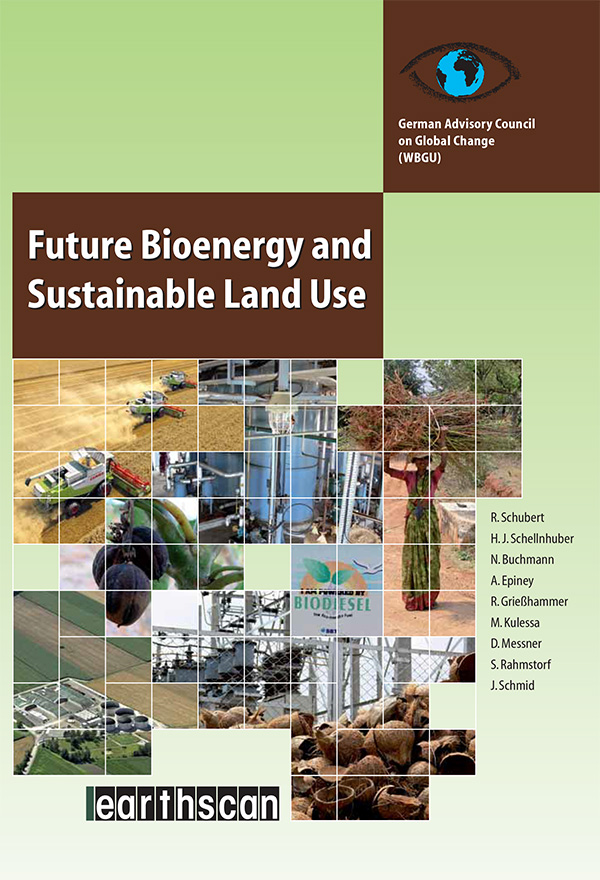
World in Transition: Future Bioenergy and Sustainable Land Use

Use should be made of the sustainable potential of bioenergy which can be tapped all over the world, provided that risks to sustainability are excluded. In particular, the use of bioenergy must not endanger food security or the goals of nature conservation and climate change mitigation.
Overview
In view of the major opportunities and risks associated with it, and the complexity of the subject, bioenergy policy has in a short time become a challenging political task for regulators and planners – a task which can only be accomplished through worldwide cooperation and the creation of an international framework. WBGU’s central message is that use should be made of the sustainable potential of bioenergy which can be tapped all over the world, provided that risks to sustainability are excluded. In particular, the use of bioenergy must not endanger food security or the goals of nature conservation and climate change mitigation.
More about this topic
More on the Subject
The WBGU welcomes reversal of EU bioenergy policy
Bioenergy for Sustainable Electricity
Voices to this Report
"Biofuels have been represented by some as a silver bullet to the climate change threat, and by others as a fatal mistake set to destroy forests and increase hunger; they are neither. Sane and sensibly developed they offer a chance to reduce emissions, generate employment and diversify rural livelihoods. But widespread commercialisation without proper sustainability standards could prove a disaster, causing more environmental and human harm than good. The new WBGU report shows that a sustainable use of bioenergy is possible and outlines how opportunities can be exploited while at the same time minimizing risks. The report thus offers policy-makers valuable guidance for a sustainable bioenergy policy."
Achim Steiner, Executive Director of the United Nations Environment Programme (UNEP) (2006 – 2014)
PDF Downloads
German
- Download: Vollversion (PDF, 25 MB)
- Download: Kurzfassung (PDF, 900 KB)
English
- Download: Full Version (PDF, 16 MB)
- Download: Summary (PDF, 880 KB)
Commissioned Expert's Studies
External expert studies are comissoned by WBGU, the responsibility for the content rests with the author.
- Download: Beringer, Lucht: Nachhaltiges globales Bioenergiepotenzial. (PDF, 14 MB)
- Download: Berndes: Water demand for global bioenergy production: trends, risks and opportunities. (PDF, 3 MB)
- Download: Faaij: Bioenergy and global food security. (PDF, 2 MB)
- Download: Fritsche, Wiegmann: Treibhausgasbilanzen und kumulierter Primärenergieverbrauch von Bioenergie-Konversionspfaden unter Berücksichtigung möglicher Landnutzungsänderungen. (PDF, 2 MB)
- Download: Levidow, Paul: Land-use, Bioenergy and Agro-biotechnology. (PDF, 2 MB)
- Download: Müller-Langer, Perimenis, Brauer, Thrän, Kaltschmitt: Technische und ökonomische Bewertung von Bioenergie-Konversionspfaden. (PDF, 2 MB)
- Download: Rosegrant, Cavalieri: Bioenergy and Agro-biotechnology. (PDF, 2 MB)
- Download: Rosegrant, Ewing, Msangi, Zhu: Bioenergy and Global Food Situation until 2020/2050. (PDF, 1 MB)
- Download: Schinninger: Globale Landnutzung (PDF, 4 MB)
- Download: von Koerber, Kretschmer, Prinz: Globale Ernährungsgewohnheiten und -trends. (PDF, 350 KB)